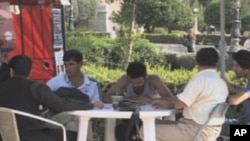Every year, hundreds of thousands of migrants leave their home countries for Europe dreaming of a better life. Many cross into the European Union illegally hoping to either evade detection or request political asylum. Often they pay traffickers thousands of dollars to help them reach the EU. Most of these journeys used to involve crossing the Mediterranean from Africa by boat. But in recent months there's been a huge influx of migrants across the land border between Turkey and Greece - 58,000 illegal entries in the first six months of 2010 alone. VOA traveled to Greece and found that once over the border, the migrants' problems are only just beginning.
For Abdul Samat and Nabir Hamad, it's been an epic journey of more than 6,000 kilometers starting in Bangladesh. They have finally arrived in Greece and they're exhausted.
"We came through India and Pakistan, Iran and Turkey," he explained. "It's taken us 20 days. the journey was very hard and we had no food."
Soon after crossing into Greece, Samat and Hamad were arrested. But like the other migrants sheltering here in Alexandroupolis,10 kilometers from the Turkish border, they were released because detention centers for migrants are full. By all measures, the two are lucky.
Almost all the undocumented migrants entering Europe - some 300 every day from Africa, the Middle East and Asia - cross the Evros River that divides Turkey and Greece. There are nowhere near enough border guards to stem the flow. Once in Greece, the migrants are in the European Union.
But the crossing is dangerous as shown in this video taken by the United Nations refugee agency, the UNHCR. Hundreds of migrants lose their lives every year.
Many end up here, in this mass grave for Muslim immigrants near the border. No-one knows the identity of those buried here. Their families back home are unaware of their fate.
Wajid Sharifi is an Afghan refugee who crossed the Evros River into Greece four years ago. He took VOA to see the mass grave.
"The people who are buried here had a dream to come to Europe for a better and brighter future but now they are buried here because they drowned cross the river or stepped on mines on the border," Sharifi said.
From the Muslim village of Sidiro, the call to prayer reverberates across the valley. The Mufti at the Sidiro mosque officiated at the burials.
"There are many more burial sites like the one in this village," he said. "The official graveyards around Alexandroupolis are full, because there are so many bodies."
For those who do make it over, the battle to start a new life in Europe is only just beginning.
A video was taken outside a police station in Athens where migrants seeking asylum are issued so-called Red Cards. The card allows them to remain in Greece while their cases are being heard. But Red Cards have to be renewed monthly. This is the queue for renewals. There's a backlog of more than 45,000 cases.
Amir Hosein is an asylum seeker from Iran, part of a group that set up a protest camp in Athens. He recorded the video.
One in the group has just obtained a Greek passport after he and five others went on a hunger strike.
"We ask all the governments of the world to hear our voice," Hosein said. "Are you waiting for our children, six or seven year old kids, to sow up their mouths as well until you pay attention to us and hear our voice?"
Meanwhile, many migrants struggle to survive on the streets of Athens where neo fascists often beat them up.
The United Nations' refugee agency says the situation is a humanitarian crisis and has called on the Greek government to reform its asylum process.
Until that happens, many migrants will find their dream of a new life in Europe has died on these ancient streets in Greece.




